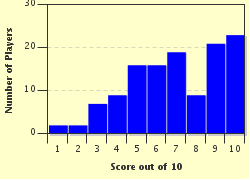Quiz Answer Key and Fun Facts
1. Genesis 24:17 tells of a woman who was so beautiful, Abraham's servant ran to meet her. What was the young woman's name?
2. 1 Kings 1:5 tells of a man aspiring to become king of Israel. To promote his case he rode in a chariot and had fifty men run before him. What was the name of the would-be king?
3. 1 Kings 18:46 tells of a prophet of God outrunning a king in a chariot pulled by a team of horses after scoring a spectacular victory over 450 prophets of Baal on Mount Carmel. Who was the fleet-footed prophet of God?
4. Isaiah 40:31 tells of people who "shall run and not be weary" and they "shall walk and not faint." What kind of people are they, according to the NKJV?
5. Acts 8:30 tells of a worker in the early church running to catch up with a man reading Scripture while riding in a chariot. What was the name of the running evangelist?
6. According to Mark 5:6, a man who was tortured by a large number of demons saw Jesus from afar and after running to Him, fell at His feet and worshipped Him. Although the man is not identified, he is commonly referred to by many Christians as the Running Rager.
7. According to Luke 19:4, a diminutive tax collector, upon seeing Jesus about to pass by, ran ahead and climbed a tree to get a better view. What was his name?
8. Matthew 27:46-48 tells of a man "immediately" running to find a sponge filled with sour wine for the dying Jesus on the cross. What was the man's name?
9. According to Matthew 28:8, two women "went out quickly" from an empty tomb and ran to tell the disciples Christ had risen from the dead. What were their names?
10. According to John 20:4, Peter was outrun by another disciple to Christ's tomb after they had been told a large stone had been rolled away from the entrance and there was no body inside. Who, according to Christian TRADITION, beat Peter in the footrace to the tomb?
Source: Author
Cowrofl
This quiz was reviewed by FunTrivia editor
CellarDoor before going online.
Any errors found in FunTrivia content are routinely corrected through our feedback system.

